Europe and America 2007 .. no one can escape the global village now?
Nov 15th, 2007 | By Citizen X | Category: Countries of the World Viewed up close, the Canadian historian Frank Underhill said long ago, the most striking thing about the USA is its almost dazzling variety. And along with all the US citizens who still worship the Grand Canyon, there are those alluded to in a November 13, 2007 Reuters article: “Many Americans are opting for French foie gras instead of a traditional Turkey drumstick this Thanksgiving holiday, even if the dollar doesn’t go as far in Europe these days.” As a North American still only recently returned from a mass-market tour of at least southern or Mediterranean Europe, I have also acquired fresh scepticism about all talk of fundamental cleavages between Europe and America. No doubt, America is more Aboriginal (as we say in Canada) and African – and in various senses nowadays more Asian too. But like other parts of the world Europe itself is quite Americanized in the early 21st century. In fact the “European Union is China’s biggest foreign trading partner, ahead of the United States and Japan.” There are indeed American tourists crawling all over the ancient Greek and Roman birthplaces of what we still rather archaically call “the West.” And you do have wonder where it all will end.
Viewed up close, the Canadian historian Frank Underhill said long ago, the most striking thing about the USA is its almost dazzling variety. And along with all the US citizens who still worship the Grand Canyon, there are those alluded to in a November 13, 2007 Reuters article: “Many Americans are opting for French foie gras instead of a traditional Turkey drumstick this Thanksgiving holiday, even if the dollar doesn’t go as far in Europe these days.” As a North American still only recently returned from a mass-market tour of at least southern or Mediterranean Europe, I have also acquired fresh scepticism about all talk of fundamental cleavages between Europe and America. No doubt, America is more Aboriginal (as we say in Canada) and African – and in various senses nowadays more Asian too. But like other parts of the world Europe itself is quite Americanized in the early 21st century. In fact the “European Union is China’s biggest foreign trading partner, ahead of the United States and Japan.” There are indeed American tourists crawling all over the ancient Greek and Roman birthplaces of what we still rather archaically call “the West.” And you do have wonder where it all will end.
1. Americans flock to Europe despite weak dollar
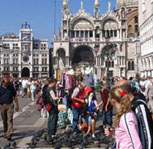 According to Amy Ziff, editor at large for No. 2 US travel Web site Travelocity: “The fact that we’re seeing more people going to Europe despite the fact the dollar just isn’t strong there is really amazing.” At the same time, “many of the bookings were made months ago, before the dollar’s most recent swoon … Ziff said travelers booked trips, on average, 85 days in advance for domestic travel and more than 100 days for international trips in order to lock in low prices and secure seats.”
According to Amy Ziff, editor at large for No. 2 US travel Web site Travelocity: “The fact that we’re seeing more people going to Europe despite the fact the dollar just isn’t strong there is really amazing.” At the same time, “many of the bookings were made months ago, before the dollar’s most recent swoon … Ziff said travelers booked trips, on average, 85 days in advance for domestic travel and more than 100 days for international trips in order to lock in low prices and secure seats.”
According to Terry Trippler, travel expert for myvacationpassport.com: “People are working hard, and a lot of people don’t like their jobs. So when they get that vacation, they’re taking it.” Chris Reiter, author of the November 13 Reuters article, carries on: “Thanksgiving, which this year is on Thursday, November 22, usually gives Americans a rare four-day weekend, as many businesses are closed the following Friday. By tacking on a few vacation days, they can stretch the holiday into a chance to take a longer trip.”
 Similarly, the “Air Transport Association expects international traffic on U.S. airlines to climb 8 percent from a year ago, compared to a 3.5 percent rise in domestic travel, said John Heimlich, the trade group’s chief economist.” Even so, this year’s “heavy Thanksgiving travel could mean lower demand later. ATA’s Heimlich said that many Americans are taking trips during Thanksgiving this year rather than over the Christmas or New Year’s holidays.”
Similarly, the “Air Transport Association expects international traffic on U.S. airlines to climb 8 percent from a year ago, compared to a 3.5 percent rise in domestic travel, said John Heimlich, the trade group’s chief economist.” Even so, this year’s “heavy Thanksgiving travel could mean lower demand later. ATA’s Heimlich said that many Americans are taking trips during Thanksgiving this year rather than over the Christmas or New Year’s holidays.”
The main point is still that if you are going to be wandering around Europe yourself next week, you can expect to see a lot of American tourists wherever you go. And that is just the way things were a month or so ago too, when my traveling companions and I were on our own low tour of southern or Mediterranean Europe – where the ancient Greek and Roman history all began.
2. Sarkozy … cultural values should not be overlooked in the race for economic growth?
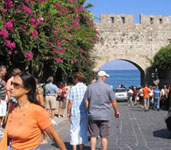 Those who remember the hoopla about how “American” he is on his latest visit to the USA may be surprised to read in the eminent US publication Business Week that: “French president Nicolas Sarkozy has outlined a vision for Europe that would see untramelled’ capitalism pushed far down the political hierarchy to be replaced by a focus on cultural and spiritual issues with more than a hint of European protectionism.”
Those who remember the hoopla about how “American” he is on his latest visit to the USA may be surprised to read in the eminent US publication Business Week that: “French president Nicolas Sarkozy has outlined a vision for Europe that would see untramelled’ capitalism pushed far down the political hierarchy to be replaced by a focus on cultural and spiritual issues with more than a hint of European protectionism.”
Business Week carries on: “According to Mr Sarkozy, who has put France firmly back at the centre of the European stage since his May election, Europeans are having a profound identity crisis…linked to globalisation and the commercialisation of the world’ … Noting that economic values seem to win the day over other values,’ Mr Sarkozy said that it is a mistake to overlook culture … Europe can only be Europe in the eyes of all men if she defends spiritual values and civilisational values, if she gathers all her forces, all her energy for defending cultural diversity.'”
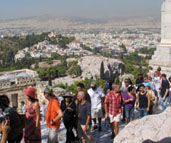 On the other hand again, it must be concerns about economic growth that lie at the bottom of President Sarkozy’s plans for pension reform, which have sparked aggressive French labour protests – culminating with an “open-ended strike” this week. According to the Guardian in the UK: “The open-ended strike is a show of strength over the president’s plans to axe special pensions privileges enjoyed by around 500,000, including railway and energy workers and backstage staff at Paris Opera and the Comdie Franaise. Some of the special deals date back to the second world war or centuries earlier and allow certain workers to retire as young as 50 …”
On the other hand again, it must be concerns about economic growth that lie at the bottom of President Sarkozy’s plans for pension reform, which have sparked aggressive French labour protests – culminating with an “open-ended strike” this week. According to the Guardian in the UK: “The open-ended strike is a show of strength over the president’s plans to axe special pensions privileges enjoyed by around 500,000, including railway and energy workers and backstage staff at Paris Opera and the Comdie Franaise. Some of the special deals date back to the second world war or centuries earlier and allow certain workers to retire as young as 50 …”
The Guardian carries on: “Sarkozy has staked his reformist credentials on facing down the protests. He is determined to stand firm on the issue which sparked three weeks of strikes in 1995 and led to a U-turn and the collapse of Jacques Chirac’s government.” It is one thing, it seems (on Mr. Sarkozy’s view), to “overlook” cultural values – but quite another to put them altogether above everything else, including economic growth. Mr. Sarkozy is still apparently France’s new “American president” after all. (Allowing at least that the America involved here probably does have a little more in common with Hillary Clinton and Barrack Obama than it does with Dick Cheney and George W. Bush?)
3. Europe to press China on trade gap, currency at summit this month
 On Monday, November 12 the International Herald Tribune reported that: “The European Union is China’s biggest foreign trading partner, ahead of the United States and Japan.” Europe has also seen its trade deficit with China “swell quickly in recent years … China ran a US$13.9 billion (9.5 billion) surplus with Europe on total two-way trade of US$31.4 billion (21.4 billion) in October, according to Chinese data … That was just behind China’s US$15.7 billion (10.7 billion) surplus with the United States on total two-way trade of US$26.7 billion (18.2 billion).”
On Monday, November 12 the International Herald Tribune reported that: “The European Union is China’s biggest foreign trading partner, ahead of the United States and Japan.” Europe has also seen its trade deficit with China “swell quickly in recent years … China ran a US$13.9 billion (9.5 billion) surplus with Europe on total two-way trade of US$31.4 billion (21.4 billion) in October, according to Chinese data … That was just behind China’s US$15.7 billion (10.7 billion) surplus with the United States on total two-way trade of US$26.7 billion (18.2 billion).”
One hardly surprising result of these statistics is that: “Many complaints by European companies and officials” about current Chinese business practices and public policies “echo those” of “their US counterparts … European companies say Chinese officials appear to be blocking them from expanding in finance and other industries in an attempt to nurture China’s own companies, violating Beijing’s free-trade pledges.”
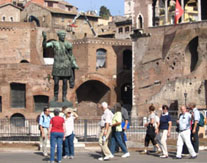 European leaders “want more attention to our specific needs, our specific concerns, in intellectual property, in product safety, in opening Chinese markets which are still not fully open, in welcoming our investment.”An “EU delegation led by Prime Minister Jose Socrates of Portugal, which holds the presidency of the 25-nation group, is due in Beijing on Nov. 28 to [meet with] Chinese leaders. A day earlier, finance officials from the two sides meet to discuss currency concerns.”
European leaders “want more attention to our specific needs, our specific concerns, in intellectual property, in product safety, in opening Chinese markets which are still not fully open, in welcoming our investment.”An “EU delegation led by Prime Minister Jose Socrates of Portugal, which holds the presidency of the 25-nation group, is due in Beijing on Nov. 28 to [meet with] Chinese leaders. A day earlier, finance officials from the two sides meet to discuss currency concerns.”
There are nonetheless apparently some limits on the congruence of US-EU policy action, despite frequent parallel interests: “Asked whether the EU would coordinate more closely with Washington and imitate the United States in filing more complaints against China in the World Trade Organization,” EU Ambassador to China Serge Abou “said Europe had no fixed group of allies and sometimes was opposed by the United States on trade issues.” (Well, of course. As President Sarkozy of France would say: “Europe can only be Europe in the eyes of all men if she defends spiritual values and civilisational values.” And even George W. Bush would nowadays probably say “men and women” or “people,” instead of just “men.”)
4. But “Europe vs. America” … surely not????
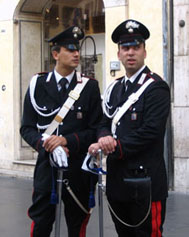 No matter how or how rapidly so-called globalization continues to proceed, over the rather uncertain horizon the global village seems to be facing right now, you don’t need to be a rocket scientist to figure out that people who live in one chunk of planet earth’s geography are never going to be exactly the same as people who live in other geographies (and other related streams of history, culture, and so forth, on and on). And that is no doubt a very good and welcome truth.
No matter how or how rapidly so-called globalization continues to proceed, over the rather uncertain horizon the global village seems to be facing right now, you don’t need to be a rocket scientist to figure out that people who live in one chunk of planet earth’s geography are never going to be exactly the same as people who live in other geographies (and other related streams of history, culture, and so forth, on and on). And that is no doubt a very good and welcome truth.
Similarly, what the excellent Canadian historian Harold Innis said back as long ago as 1930 – about how fundamentally the civilization of North America is the civilization of Europe – is no longer as convincing as it may once have been. North America today does have both fresh and in some cases at least freshly perceived and understood Aboriginal, African, and Asian dimensions. (And, by the way, give Innis due credit for also understanding the Aboriginal and even broader “multiracial” side of things in Canada much better in 1930 than many of us still grasp today.)
 Yet back as recently as February 2005 Tony Judt wrote a piece for the New York Review of Books, that someone decided to call “Europe vs. America.” And however much sense such thoughts may seem to make in libraries, they finally don’t quite stand up on the streets.
Yet back as recently as February 2005 Tony Judt wrote a piece for the New York Review of Books, that someone decided to call “Europe vs. America.” And however much sense such thoughts may seem to make in libraries, they finally don’t quite stand up on the streets.
As just one of many such examples on our own recent trip, on the Metro in Athens an ostensibly older Greek gentleman graciously volunteered some directions to the ancient Acropolis – site of so many legendary events in the early history of the so-called West. He happily spoke very good English, with something of an accent. Then he asked which part of the USA we were from, and was only somewhat disappointed to hear we were from Canada, and were not exactly proper Americans ourselves.
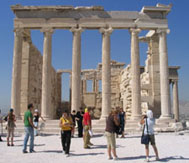 He himself, he went on to say, standing in the sunlight on the Metro car, speeding through somewhere, en route from Piraeus to Monastiraki, had spent some 35 years in Houston, Texas. He and his wife had recently returned to Greece for a time. But they still had grown-up children still living in the USA – and he seemed a bit homesick for them. He seemed as well very pleased to be talking with us, and advising us on how not to get into any trouble in Athens, with cab drivers and so forth (and even if we were not exactly proper Americans, but only people who looked and talked as if they were – no doubt much like his children back in Texas).
He himself, he went on to say, standing in the sunlight on the Metro car, speeding through somewhere, en route from Piraeus to Monastiraki, had spent some 35 years in Houston, Texas. He and his wife had recently returned to Greece for a time. But they still had grown-up children still living in the USA – and he seemed a bit homesick for them. He seemed as well very pleased to be talking with us, and advising us on how not to get into any trouble in Athens, with cab drivers and so forth (and even if we were not exactly proper Americans, but only people who looked and talked as if they were – no doubt much like his children back in Texas).
There were many similar stories in Rome, which had begun to take over the burden of President Sarkozy’s “civilisational values” from Athens, perhaps around 202 BC, when Hannibal was defeated by Rome, in a crass military victory now seen as “essential to secure the survival and expansion of Roman civilisation.” Intriguingly enough, in Rome and other parts of Italy in the fall of 2007 AD we often enough saw Chinese as well as American tourists. And of course we saw McDonald’s restaurants. We even once furtively slipped into a Burger King for ice-cold Cokes on a very hot afternoon, enroute from the Trevi Fountain to the Spanish Steps, accompanied by vast mobs of fellow tourists on some cultural pilgrimage. (And of course again a great many of the tourists were indeed Americans, determined to absorb something of the earlier world that proclaimed it did many of the appalling things it did too, in the name of “Senatus Populusque Romanus” (i.e. the “Senate and People of Rome”) – or S.P.Q.R., as it still says on surviving ancient archways, and even some modern water pipe and manhole covers of today’s Roman municipality.)
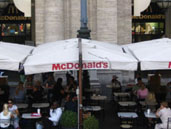 On the taxi ride from downtown Rome to the airport – with a friendly well-dressed driver keen to at least briefly point out many key suburban tourist attractions we had not managed to visit (while apologizing for the only rudimentary quality of his spoken English) – I was suddenly struck by just how Americanized the ancient eternal city has become.
On the taxi ride from downtown Rome to the airport – with a friendly well-dressed driver keen to at least briefly point out many key suburban tourist attractions we had not managed to visit (while apologizing for the only rudimentary quality of his spoken English) – I was suddenly struck by just how Americanized the ancient eternal city has become.
By this point I had managed to procure a copy of the 20 September 2007 issue of the London Review of Books. And as the flight back to North America wore endlessly on an article called “Depicting Europe” by Perry Anderson offered much additional food for thought. It ends with a reference to “Rgis Debray’s plea for a United States of the West that would absorb Europe completely into the American imperium.”
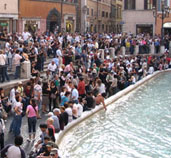 Perry Anderson continues: “Did it have to come to this? The paradox is that when Europe was less united, it was in many ways more independent. The leaders who ruled in the early stages of integration had all been formed in a world before the global hegemony of the United States, when the major European states were themselves imperial powers, whose foreign policies were self-determined. These were people who had lived through the disasters of the Second World War, but were not crushed by them. This was true not just of a figure like De Gaulle, but of Adenauer and Mollet, of Eden and Heath, all of whom were quite prepared to ignore or defy America if their ambitions demanded it. Monnet, who did not accept their national assumptions, and never clashed with the US, still shared their sense of a future in which Europeans could settle their own affairs, in another fashion. Down into the 1970s, something of this spirit lived on even in Giscard and Schmidt, as Carter discovered. But with the neo-liberal turn of the 1980s, and the arrival in power in the 1990s of a postwar generation, it faded. The new economic doctrines cast doubt on the state as a political agent, and the new leaders had never known anything except the Pax Americana. The traditional springs of autonomy were gone.
Perry Anderson continues: “Did it have to come to this? The paradox is that when Europe was less united, it was in many ways more independent. The leaders who ruled in the early stages of integration had all been formed in a world before the global hegemony of the United States, when the major European states were themselves imperial powers, whose foreign policies were self-determined. These were people who had lived through the disasters of the Second World War, but were not crushed by them. This was true not just of a figure like De Gaulle, but of Adenauer and Mollet, of Eden and Heath, all of whom were quite prepared to ignore or defy America if their ambitions demanded it. Monnet, who did not accept their national assumptions, and never clashed with the US, still shared their sense of a future in which Europeans could settle their own affairs, in another fashion. Down into the 1970s, something of this spirit lived on even in Giscard and Schmidt, as Carter discovered. But with the neo-liberal turn of the 1980s, and the arrival in power in the 1990s of a postwar generation, it faded. The new economic doctrines cast doubt on the state as a political agent, and the new leaders had never known anything except the Pax Americana. The traditional springs of autonomy were gone.
“By this time, on the other hand, the Community had doubled in size, acquired an international currency, and boasted a GDP exceeding that of the United States itself. Statistically, the conditions for an independent Europe existed as never before. But politically, they had been reversed. With the decay of federalism and the deflation of inter-governmentalism, the Union had weakened national, without creating a supranational, sovereignty, leaving rulers adrift in an ill-defined limbo between the two …
 “With the eclipse of significant distinctions between left and right, other motives of an earlier independence have also waned. In the syrup of la pense unique, little separates the market-friendly wisdom of one side of the Atlantic from the other, though as befits the derivative, the recipe is still blander in Europe than America, where political differences are less extinct. In such conditions, an enthusiast can find no higher praise for the Union than to compare it to one of the most successful companies in global history’. Which firm confers this honour on Brussels? Why, the one in your wallet. The EU is already closer to Visa than it is to a state’, declares New Labour’s Mark Leonard, exalting Europe to the rank of a credit card.”
“With the eclipse of significant distinctions between left and right, other motives of an earlier independence have also waned. In the syrup of la pense unique, little separates the market-friendly wisdom of one side of the Atlantic from the other, though as befits the derivative, the recipe is still blander in Europe than America, where political differences are less extinct. In such conditions, an enthusiast can find no higher praise for the Union than to compare it to one of the most successful companies in global history’. Which firm confers this honour on Brussels? Why, the one in your wallet. The EU is already closer to Visa than it is to a state’, declares New Labour’s Mark Leonard, exalting Europe to the rank of a credit card.”
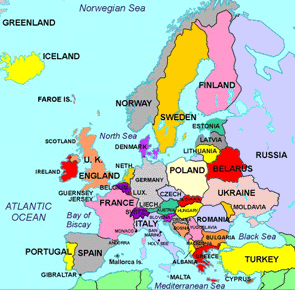 However you look at it, it seems a pretty safe bet that most of the Americans who are flocking to Europe for the most characteristic and important US domestic holiday of Thanksgiving this year will be having a pretty good time. And thanks to all the McDonald’s and Burger King’s and other such institutions that both sides of the Atlantic now share (to say nothing of Chinese textiles), there is very little chance that many of them will be getting seriously homesick at all.
However you look at it, it seems a pretty safe bet that most of the Americans who are flocking to Europe for the most characteristic and important US domestic holiday of Thanksgiving this year will be having a pretty good time. And thanks to all the McDonald’s and Burger King’s and other such institutions that both sides of the Atlantic now share (to say nothing of Chinese textiles), there is very little chance that many of them will be getting seriously homesick at all.

